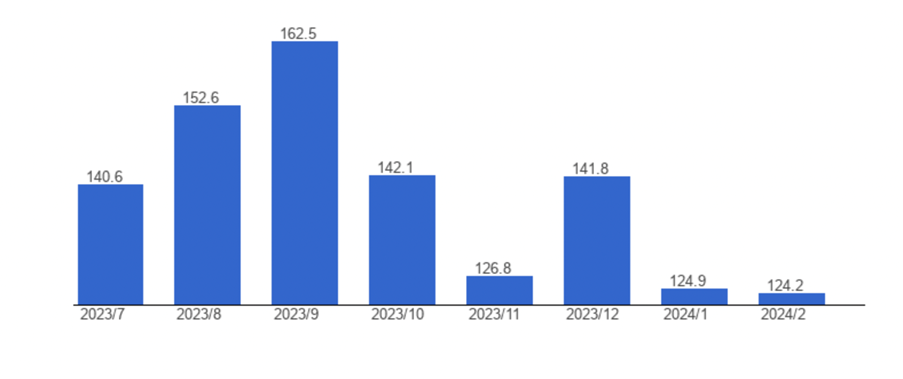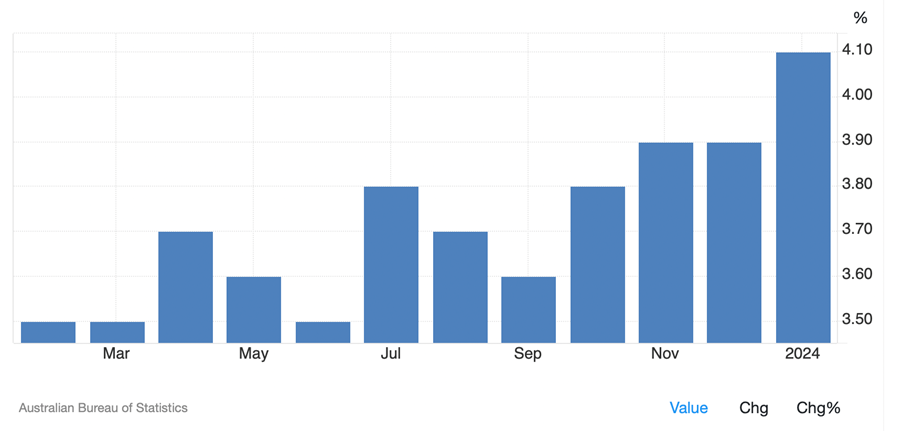

The existence of labour hire firms is set to come under pressure following the union’s deal with the Albanese government to use the “same job same pay” mantra as the basis of a Fair Work Commission challenge. And while this sounds unquestionably fair in theory, does it work out in the real world of business?
The AFR’s David Marin-Guzman says for the 330 labour hire workers at the Callide coal mine at Biloela in central Queensland, which is owned by a private company called Batchfire, it could mean a $20,000 lift in pay. On rough calculations, that’s about a $6.6 million lift to the mine’s wage bill. This comes when coal prices have been higher than expected but currently are on a slide downward.
Recent coal prices (US dollars a tonne)

This World Bank chart clearly shows that the trend has been down for coal prices, but the longer-term chart below shows how coal prices have recently really slumped.

These higher wage demands come as 13 interest rate rises here and similar rate hikes globally have slowed down world growth, with our most important coal-buyer, China, still struggling to get growing faster following their strict Covid lockdowns.
It looks like these demands for higher pay for these miners is a test case for the unions at the Fair Work Commission. If they win, there’ll be more petitions on behalf of labour hire workers for equal pay.
Just as this is the predictable behaviour of unions, we’re seeing the mining industry respond in a typical way.
“This is the start of a long-term union campaign to disrupt workplace arrangements throughout the economy, heaping further pressure on investment and jobs growth,” Minerals Council of Australia chief executive Tania Constable told the AFR. “At a time when the Australian economy enters a period of uncertainty, marked by lower economic growth and higher unemployment, this union power grab will make things more difficult for job-creating businesses, large and small.
“The consequences for Australian households are profound: less jobs, more disruption and an increase in cost of living.”
While fighting for higher pay is the union’s job, with inflation on the way down and many union members also being homeowners with loans, if their wage demands sustain inflation, it will delay rate cuts from the Reserve Bank.
This comes at a time when recent wage rises have outpaced inflation, which is good for the real wages of employees but bad for keeping inflation elevated.
Wage rises can be OK provided productivity is increasing, as the former increases costs while the latter decreases costs. Unfortunately, our latest productivity report wasn’t great news. “Labour productivity in Australia fell by 3.7% in 2022-23 as output growth failed to keep pace with a surge in hours worked,” hcmag.com reported recently.
“Productivity Commission Deputy Chair Alex Robson said the Annual Productivity Bulletin 2024 provides a clearer understanding behind Australia's productivity slump. The drop was attributed to the record-high 6.9% increase in hours worked by employees, which led to average incomes increasing despite slow hourly wage growth as more Australians spent longer time working.”
The unions call the use of labour hire as “worker exploitation”, while the miners would argue it’s a way of dealing with Australia’s higher wages compared to other countries that our miners compete with.
From the outside, someone like me can’t work out the impact on Batchfire’s bottom line but if costs are rising as coal prices are falling, we might see great investment in machines to boost productivity, but these machines could replace workers who are too expensive.
Unions asking for higher pay as unemployment is rising looks like bad timing for labour hire firms and workers, with the chart below showing how the jobless rate is on the rise. And it’s expected to go higher.
Unemployment

There are 600,000 labour hire works in Australia. If they all received a $20,000 a year increase in pay, that would add a $12 billion to the national wage bill. That’s not an insignificant amount!